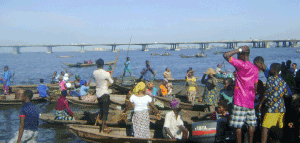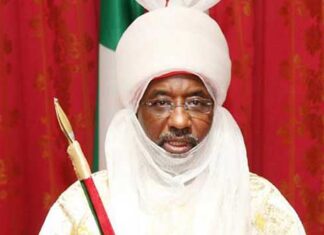International interest in Makoko was rekindled recently when the President of Ford Foundation, Darren Walker, visited the slum in Lagos. Woman Editor, TEMITOPE DAVID-ADEGBOYE, and Reporter, REGINA WHENU, were there.
Some visit to satisfy curiosity. Some come with promises never fulfilled. Others have come, have seen the degradation, and have helped.
Even with a tinge of not knowing what they will get in the end, the dwellers in rickety homes on murky Makoko waters in Lagos were still excited when another group of visitors came calling, this time from across the Atlantic in far away United States.
On paper, their desire for a conducive living environment and quality social infrastructure may soon be realised in a slum that stretches along the coastal fringe of the Lagos lagoon, from Yaba to Bariga.
Daily grind
They catch fish; sell fish, sell gin distilled and sailed in from the coasts of Ondo, Edo and Delta States. They sell cigarettes, fruits; tomatoes, pepper, onions; and raise children.
The people have lived like this for nearly a century. As past time, they stage cultural festivals, but have recently added watching European football on television.
In May, the community, a source of curiosity over the years, played host to the President of Ford Foundation, Darren Walker, accompanied by other officials.
TheNiche got wind of the coming of Walker to Makoko and rushed to the area to be part of the history about to be made.
Major activities came to a standstill, as men, women and children trooped out to welcome Walker, an African-American, who came to take in the scent and the feel of Makoko and to assess how the Foundation can help.
For the two hours, the people’s joy knew no bounds as they staged a mini regatta to entertain their august visitors. Pupils of Whanayinna Nursery and Primary School, the only school in town, did a march past.
Francis Agoyon, the Awe of Mokoko, told the visitors of the many issues facing the community, which include a lack of good health care facilities, good schools, befitting homes, electricity, water and waste disposal amenities.
Agoyon disclosed that representatives of the community, in conjunction with Social and Economic Rights’ Action Centre (SERAC), are in talks with the Lagos State Ministry of Environment, Physical Planning and Urban Development to devise a new plan for the slum.
The working group responsible for developing the overall Makoko regeneration scheme is led by SERAC, a human rights organisation that has been with the community since 2012 in the struggle to keep its heritage.
The plan is expected to be submitted to the Ministry for Physical Planning and Urban Development this year.
Another organisation, Fabulous Urban, is developing the “spatial economy” approach, working with four people and several experts in Lagos on the research, conception and design of an economic development plan for the community, Agoyon added.
Pronto. Walker bought into the Makoko Heritage. He described Makoko as “amazing, awesome” and promised to do everything within his power to ensure it retains its heritage. “I feel at home and I am inspired. This is not just a community but a vibrant community.”
He praised the people for sustaining the passion to retain their heritage saying, “the world is watching you.”
Leaders of the community took the visitors on a guided tour of the community. The team, accompanied by officials of SERAC, used the opportunity to mark the 19th anniversary of SERAC by cutting a cake.
As part of efforts to make Lagos a mega-city, the state government in 2012 demolished all shanties around the coastal lines. Makoko was affected. But the people resisted being thrown out of where they have known as home for almost a century.
They went to court with the assistance of SERAC and got a stay of action. But demolition left a section of the expansive slum devastated, as if a hurricane swept through the closed society with many inhabitants still trying to pick pieces of their belongings.
Part of the welcome party.
Serac the advocate
Established in May 1995, SERAC is a Lagos-based non-governmental and non-partisan organisation which promotes and protects economic, social and cultural rights (ESC) in Nigeria.
Through its integrated models – monitoring and advocacy programme (MAP), community action programme (CAP), legal action programme (LAP) and policy advocacy programme (PAP) – SERAC seeks to build awareness about economic, social and cultural rights and explore strategies to realise them.
It also aims to broaden the access of individuals and communities to, and strengthen their participation in, the design and implementation of social and economic policies and programmes that affect them.
An estimated 45,840 people reside in Makoko in housing units built on stilts. However, the area was not officially counted as part of the 2007 census and the population today is considered to be much higher.
The community has no roads, no land and no formal infrastructure to support daily survival. In many ways, Makoko epitomises the most critical challenges posed by urbanisation and climate change in coastal Africa.
At the same time, it also inspires possible solutions and alternatives to the invasive culture of land reclamation.
Races and religions on the lagoon
Some of the residents are migrants from Benin Republic. But three ethnic groups dominate the community: Ijaw, Ilaje and Egun; 94 per cent of whom are Christians, 6 per cent Muslims. All have lived in the community for over 70 years.
A walk through the over-the-water section of the enclave is enough to convince you that here is a complete community.
On the lagoon, there are eateries as there are other needful service providers such as barbers, tailors, chemists, boat repairers and borehole owners. Football lovers have the privilege of watching their favourite European clubs play as there is a viewing centre where they gather.
There are churches of different denominations – Mountain of Fire and Miracles Ministries, Redeemed Christian Church of God, Celestial Church of Christ and Cherubim and Seraphim.
The community also has two mosques.
There is the floating market of food sellers and vendors of other household commodities.
The lower-crust populace of the shantytown considers the lagoon their mainstay in all ramifications; the lagoon is their livelihood.
They have lived there even before the coming of the colonialists, and today, many of the new generation have been raised with the orientation and sophistication of a modern man. Yet fish sold in some markets in urban Lagos are brought from Makoko, where men are predominantly fishermen and women do the selling.
UNIDO boost
Last year, the community received a boost from the United Nations Development Fund (UNDP), which commissioned a Nigerian architect, Kunle Adeyemi, to design a school that floats on 256 recycled plastic barrels.
Makoko Floating School is a prototype structure that members of the community hope would address school congestion.
The three-storey floating structure adapts to the tidal changes and varying water levels, making it invulnerable to flooding and storm surges. It is designed to use renewable energy, to recycle organic waste and to harvest rainwater.
The structure accommodates 100 children who travel to and fro by boat. When classes are out, the lower platform is used as a community space: fishermen sit and mend their nets or take naps in the shade.
State Information and Strategy Commissioner, Lateef Ibirogba, explained that government intervention in Makoko gave rise to the idea of relocating the residents.
“We thought we would solve the Makoko problem as we did with the people of Oko-Baba who have accepted our relocation programme.
“But it appears Makoko people don’t want to be relocated. That is why some of the structures built on the lagoon beyond acceptable boundaries were pulled down,” Ibirogba said.
Dream of Lagos Venice
Since the settlers were not persuaded by the resettlement plan, the government came up with the idea of re-organising them in such a way that they could become sustainable as a community and in tune with modern trends. The thought of a Lagos Venice was mooted.
The Ministry of Environment, Physical Planning and Urban Development is working on it, according to Ibirogba.
But the plan poses a huge challenge to the government as it would also mean cleaning up the water, providing potable water there on a sustainable basis, and providing waste and sewage treatment plants.
With a Venice idea conceived and waiting to be delivered in Makoko, the government has thus taken the decision to, within reasonable and safe limits, permit the communities on water to exist in designated areas and integrate them into the overall fiscal planning and urban fabric of the Lagos Mega City.
The government said it would restrict them to well-defined limits and introduce a phased housing, infrastructure and facilities improvement plan, in consultation with the communities, under a programme called ‘Houses on Water Improvement Programme’.
Enter Dangote, Africa’s richest man
But it appears hope continues to rise for Makoko residents upon intervention from abroad.
Walker did not just visit, he also had a meeting with the richest man in Africa, Aliko Dangote, on how to exploit the huge resources on the continent to help the underpriviledged, including Makoko dwellers.













